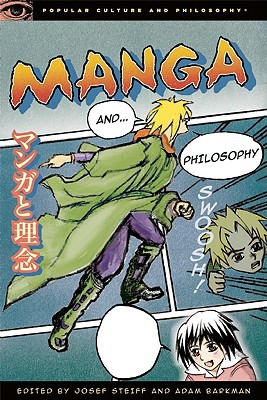

 |

|

The average rating for Manga and Philosophy (Popular Culture and Philosophy) based on 2 reviews is 3 stars.
Review # 1 was written on 2011-07-27 00:00:00 Cameron Hearne Cameron HearneThis book is a good introduction to Japanese manga for those who weren't aware of it and became interested after hearing about it. It's also a satisfying read for anyone who has read manga. I thought that the way the cover and the very first page was set up was pretty clever as it teaches readers how to read manga. The book's introduction, titled Fullmetal Metaphysician, is found by flipping the book over to the back; since it is written like manga, it teaches readers the basics of manga, including the way its read, the different age classifications, and how it's suitable for writing differnet genres. The rest of the book, written in traditional western format, is devoted to essays written by professors and students who are interested in the subject of philosophy in manga. Each essay gives differnet philosophical interpretations of a few manga selected as examples. A few manga are covered extensively, including the works of Osamu Tezuka, the "God of Manga," and Death Note. Others, like Fullmetal Alchemist, are disappointingly brief. Although there are many more manga besides the ones covered here, it makes sense to cover a few as attempting to interpret the philosophies of a lot of manga in one book would be next to impossible. Therefore, this book should be read like a textbook for Pop Culture and Philosophy 101 and as a guide for beginning readers of manga. |
Review # 2 was written on 2012-12-17 00:00:00 Kevin Massie Kevin MassieStill, what's disturbing about this book, common to both our cultures, really, is that even supposedly environmental accounts of the future are virulently post-apocalyptic. Notwithstanding evidence that would tend to endorse the phrase "Apocalypse Now," there is a strong element of self-fulfilling prophecy, not to mention self-defeat in this outpouring of self-loathing. Consider this "advice" from p. 159 "The ending of To Terra, with all the main characters dead and Terra destroyed, may seem equally depressing. But the maturation process is always fraught with frustration and loss. Rather than passively submitting to fantasies of maternal attachment, To Terra urges its readers to grow up." Philosophy has begun from any number of "starting points," as if assiduously avoiding one of the simplest facts of human existence, that the only reason any of us survive birth in the first place is maternal attachment of some kind. If "growing up" involves endorsing a "transvaluation of value" that endorses such psychosis, then Joni Mitchell covered that advice as well. |
CAN'T FIND WHAT YOU'RE LOOKING FOR? CLICK HERE!!!